America is Lost!
Dr Angel Luke O’Donnell, Teaching Fellow in North American History, King’s College London
Jump to Essay Transcription & Images
The ‘America is Lost!’ piece was a short essay written by George III reviewing the causes and effects of the American Revolution. It potentially provides a fascinating insight into the thoughts of King George about the future of the British Empire after the loss of America; however, researchers need to be cautious about how they approach the essay. The words of the essay substantively replicate a published essay by Arthur Young, a leading British agricultural theorist who shared George’s passion for improving farming techniques. Therefore, before analysing the language of the piece, we must first determine why Young’s words appear in the handwriting of the King.
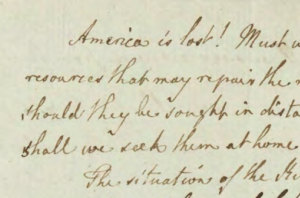
George III’s essay on the loss of the American colonies RA GEO/ADD/32/2010. Royal Archives/© Her Majesty Queen Elizabeth II 2017
There are two likely explanations for this situation. In one case, Young may have shared with George an earlier draft that the King copied and possibly amended. The second explanation is that George copied Young’s published essay then adapted the words in order to help him make sense of them, a conventional eighteenth-century process for learning called commonplacing. Each scenario prompts a slightly different interpretation of how the words reflect George’s thoughts on the British Empire. If the first scenario proves to be the most likely explanation then it suggests George may have corresponded with Young about his ideas in ways that have been overlooked until now. If the second scenario proves more plausible, then George’s editorial changes may indicate how the King imagined the future of the British Empire. To answer the question fully, researchers will need to work through the material emerging out of the Georgian Papers Programme. We will need to understand the relationship between George and Young better, especially to look for letters between the men discussing this or other drafts. It is also important to think about the essay in the context of other pieces emerging from the archive to understand how George used essays and notes to make sense of the world around him. Whatever the outcome, further study into the King’s essays promises to reveal something about George and his thoughts on the British Empire.
My own conclusion about the ‘America is Lost!’ piece is that George copied and edited the words of Young’s published essay. Commonplacing was a common occurrence and there are other examples in the archive where the words of published texts appear in George’s hand. By copying and revising Young’s published essay, the King’s editorial decisions can provide insights into his thoughts on the British Empire, even though the words were not his. George was very selective about the passages he copied from Young. Young’s essay was seventy-eight printed pages and George’s essay was just over three handwritten pages. This act of condensing the original was an intellectual process that merits attention. Moreover, though George generally copied Young’s words verbatim, there are significant omissions and rephrasing that suggest George edited the essay to suit his own needs. George’s version of ‘America is Lost!’ actually stands up as an essay in its own right. It is not clear where George has deleted or adapted passages in Young, nor does the King indicate that he is quoting from another source. Ultimately, George changed Young’s argument by abridging it, converting Young’s pessimistic forecast about the British Empire into something more optimistic. The key difference between the two versions is that Young argued for agricultural development in Britain by emphasising the inevitability of colonial rebellion, in America as well as in Canada and India; whereas, George deleted these passages to concentrate on Young’s assessment of the American Revolution and the need to preserve, rather than increase, the territories of the British Empire.
The essay George copied from Young was the first essay in the first volume of Young’s influential Annals of Agriculture. Young argued that Britons could create immense wealth by cultivating the wastelands throughout Britain by using the best agricultural practices. In effect, the essay justified the need for Annals as a journal for sharing agricultural research. As part of his argument, Young claimed that the money Britain spent on developing lands in the colonies would have been better spent on improving British lands. Not only would the investment have contributed greatly to the national income, but as demonstrated by the American Revolution, the dividends from investing in British lands were also more secure than colonial improvements. Young distinguished between the southern and northern colonies. The southern and Caribbean colonies contributed toward the British national income by trading sugar, tobacco, and rice, commodities that could not be grown in Britain. The northern colonies—Pennsylvania, New York, and Massachusetts—had long been trade rivals rather than colonies. In fact, Young asserted the northern colonies were more valuable as trading partners. Young argued that unless a colony produced cash crops, like tobacco or sugar, then they were only useful as commercial partners. Significantly, he believed that this trading relationship worked to dissolve the imperial relationship. He applied this same logic to the rest of the Empire. He believed that the Indians would throw out the rapacious and corrupt East India Company to the detriment of Britain generally. He also argued that Canada would either remain a poor colony and therefore useless to Britain, or it would grow rich and eventually revolt against the crown. Young believed the most secure form of wealth was to make British agriculture as efficient as possible by experimenting with enlightened farming methods. The message of Young’s essay was that after American independence, Britain needed to militate against the loss of the remaining colonies by improving British land.
George made a number of subtle editorial changes to Young’s piece that significantly altered the essay’s argument. Firstly, George rephrased and removed passages in Young that exaggerated the differences between British and colonial people. For example, George often moderated Young’s language, such as when Young wrote: ‘The wars of 1744, 1756, and 1775 were all entered into, because the beggars, fanaticks, felons, and madmen of the kingdom, had been encouraged in their speculation of settling the wilds of North America.’ George wrote instead: ‘The wars of 1744, 1756, and 1775 were all entered into from the encouragement given the speculation of settling the wilds of North America.’ The King kept Young’s argument that land speculation in America had prompted war, but removed the incendiary idea that it was the felons and undesirables of Britain that created the land speculation. Furthermore, throughout the original essay, Young discussed his participation in longstanding public debates about the profitability of the colonies to Britain. Young condemned rival British commentators who had argued that the colonies were the source of Britain’s wealth. He claimed these commentators had ‘deceived’ Britain and ‘mislead themselves’. George removed the references to these debates. Likewise, George did not copy out the citations and footnotes Young used to argue that revenue generated within Britain contributed more to the national income than the contributions from colonies. George avoided explicitly endorsing Young’s argument by deleting these segments. For Young, disproving the commonly held belief of colonial profitability was crucial to his argument for investing in British wastelands, but George’s deletions imply he did not wholly agree with Young that national wealth rested on the domestic British economy. Young accentuated the differences between Britain and its colonies, while George seemed to resist the distinction. Taken together, these changes suggest that while Young predicted the end of Empire, George was more optimistic.
This more sanguine view of Empire is evident in the final paragraphs of George’s essay. The King condensed a three-page section from the original into a short conclusion that reframed Young’s argument about a declining British Empire. Over the three pages, Young described how he foresaw the end of Britain’s relationship with its colonies. He argued that though the Caribbean islands and India added to the fortunes of the Empire in a way the northern colonies never had, the ‘East and West Indies’ were both destined to split away from Britain. A naval alliance between the newly independent US and France would make British occupation of the Caribbean islands untenable, and in India, Young said the East India Company’s abhorrent behaviour in the region would mean ‘one day must come. — It ought to come’ when they would throw off British authority. Finally, though the 1783 Peace of Paris that ended the war preserved Canada as a British colony, for Young, it was so poor as to be worthless. He continued that as soon as Canada became economically profitable it would revolt like the other American colonies. Ultimately, Young argued the British Empire was doomed because the internal strength of the colonies was insufficient to keep them British and only the Royal Navy could keep them within the Empire.
Rather than building a bigger navy, Young believed that British colonial policy should aim at preserving rather than increasing the Empire. The implication was that Britain would effectively turn inward and use colonial profits to grow the domestic economy until the remaining imperial outposts eventually became independent. In the following sixty-seven pages of the original essay, Young discussed the advantages and profits of developing Britain’s agriculture. However, George stopped copying Young at the idea of preserving the Empire. Moreover in the concluding paragraph of George’s essay, the King significantly rephrased Young. Compare the original with George’s editing:
That they are insecure no man can be hardy enough [George: ‘No man can be hardy enough to deny that they are insecure’]: to add therefore to their value by exertions of policy that shall have the effect of directing any stream of capital, industry, or population into those channels, would be to add to a disproportion already an evil. The more we are convinced of the vast importance of these territories, the more we must feel the insecurity of our power. If they were of such a magnitude as to be essential to our political existence, it would be no paradox to assert, that the misfortune would be yet greater. Our view therefore out not to be to increase but preservation [George: ‘our view therefore out not to be to increase but preserve them.’]
The first and last sentences reflect George’s preference to simplify Young’s phrasing without substantially changing the meaning. However, the deleted sentence changes the tone of the conclusion. Both Young and George agreed that investment in the colonies was insecure and the bigger the colony then the more insecure the investment. Young stressed this point to say that if the colonies were essential to Britain then its political existence was under threat. Yet Young inferred that the colonies were not essential to Britain’s political existence and therefore colonial policy should not be about expansion and the exertions of capital, industry, and population should be directed inward within Britain. By removing Young’s conditional sentence, George implied that the colonial policy should be about preserving rather than increasing the Empire. As such, George’s essay becomes a reflection on how to preserve the Empire after the loss of America by changing the British approach to Empire.
The original essay proposed that Britain should turn inward away from the Empire. By contrast, while George used most of Young’s words and agreed with his assessment of the Revolution, the King arrived at a different conclusion. Young foresaw the end of the British Empire, but George largely edited out this pessimism to leave behind a more constructive essay about the causes of the Revolution and the solutions to preserving the colonies. In answer to the opening questions, after the loss of America Britain had to improve its use of resources to ‘repair the mischief’ and preserve the Empire. Ultimately, this short commentary on the ‘America is Lost!’ essay is a suggestive conclusion from looking at just one text. There are still many more items in the Royal Archives to identify, analyse, and evaluate. In isolation, the essay prompts many interesting questions that are central to understanding the King’s attitude to the loss of the American colonies. I look forward over the next years to returning and digesting this material still further. Particularly, I want to study whether the King had a consistent editorial style. Perhaps by analysing the other essays then we can discern recurrent themes or preferred modes of expression. Perhaps the King generally avoided disputes between authors. Perhaps he disdained to copy out inflammatory or divisive language. Editing is a creative process just like writing. It is a series of meaningful decisions that demonstrate an editor’s purposeful engagement with the ideas in the text. King George seems to have been an avid copyist, and I believe his editorial style can provide new insights into his private reflections and a broader context to his correspondence.
Transcription
Transcription provided is the raw transcription, initial product of student transcribers. Text is not corrected nor proofed.
Download full raw transcription: RA GEO_ADD_32_2010_Raw Transcripton (pdf)
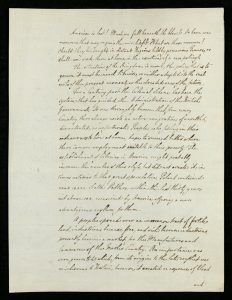 |
America is lost! Must we fall beneath the blow? Or have we resources that may repair the mischiefs? What are those resources? Should they be sought in distant Regions held by precarious Tenure, or shall we seek them at home in the exertions of a new policy? For a Century past the Colonial Scheme has been the system that has guided the Administration of the British Government. It was thoroughly known that from every Country there always exists an active emigration of unsettled, discontented, or unfortunate People who failing in their endeavours to live at home, hope to succeed better where there is more employment suitable to their poverty. The establishment of Colonies in America might probably increase the number of this class, but did not create it; in times anterior to that great speculation, Poland contained near 10.000 Scotch Pedlars; within the last thirty years not above 100. occasioned by America offering a more advantageous asylum for them. A people spread over an immense tract of fertile land, industrious because free, and rich because industrious, presently became a market for the Manufactures and Commerce of the Mother Country. An importance was soon generated, which from its origin to the late conflict was mischievous to Britain, because it created an expence of blood and |
|
and treasure worth more at this instant if it could be at our command, than all we ever received from America. The wars of 1744. of 1756. and 1775. were all entered into from the encouragements given to the speculations of settling the wilds of North America. It is to be hoped that by degrees it will be admitted that the Northern Colonies, that is those North of Tobacco were in reality our very successful rivals in two Articles the carrying freight trade, and the Newfoundland fishery. While the Sugar Colonies added above three millions a year to the wealth of Britain, the Rice Colonies near a million and the Tobacco ones almost as much; those more to the north, so far from adding any thing to our wealth as Colonies, were trading, fishing, farming Countries, that rivalled us in many branches of our industry, and had actually deprived us of no inconsiderable share of the wealth we reaped by means of the others. This compartative view of our former territories in America is not stated with any idea of lessening the consequence of a future friendship and connection with them; on the contrary it is to be hoped we shall reap more advantages from their trade as friends than ever we could derive from them as Colonies; for there is reason to suppose we actually gained more by them while in actual rebellion, and the common open connection cut off them |
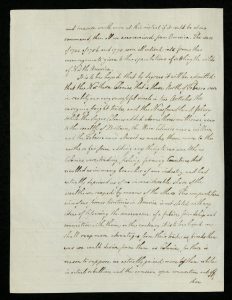 |
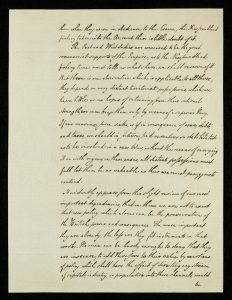 |
than when they were in obedience to the Crown; the Newfoundland fishery taken into Account, there is little doubt of it. The East and West Indies are conceived to be the great commercial supports of the Empire; as to the Newfoundland fishery time must tell us what share we shall reserve of it. But there is one observation which is applicable to all three; they depend on very distant territorial possessions, which we have little or no hopes of retaining from this internal strength, we can keep them only by means of a superior Navy. If our marine force sinks, or if in consequence of wars, debts, and taxes, we should in future find ourselves so debilitated as to be involved in a new War, without the means of carrying it on with vigour, in these cases, all distant possessions must fall let them be as valuable as their warmest panegyrists contend. It evidently appears from this slight review of our most important dependencies, that on them we are not to exert that new policy which alone can be the preservation of the British power and consequence. The more important they are already, the less are they fit instruments in that work. No man can be hardy enough to deny that they are insecure, to add therefore to their value by exertions of policy which shall have the effect of directing any stream of capital, industry, or population into those channels, would be |
|
be to add to a disproportion already an evil. The more we are convinced of the vast importance of those territories, the more we must feel the insecurity of our power; our view therefore ought not to be to increase but preserve them. |
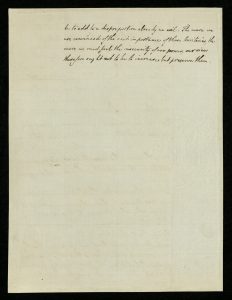 |

[…] more of Dr. O’Donnell’s interpretation of the “America is Lost!” essay on the King’s College London blog, where it was first […]
[…] Angel Luke O’Donnell, Teaching Fellow in North American History, King’s College London wrote earlier this week that the essay “substantively replicates” an earlier letter from […]
[…] Angel Luke O’Donnell, Teaching Fellow in North American History, King’s College London wrote earlier this week that the essay “substantively replicates” an earlier letter from […]
[…] Angel Luke O’Donnell, Teaching Fellow in North American History, King’s College London wrote earlier this week that the essay “substantively replicates” an earlier letter from […]